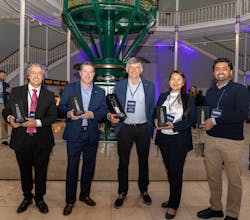Lighthouse Award winners named at BlueTech Forum
Collaboration was the key to success for the seven winners of the 2023 Lighthouse Awards, which were presented during BlueTech Forum in Edinburgh, Scotland. Pioneers and visionaries within the water sector were recognized at a ceremony held at the National Museum of Scotland on May 17.
Projects for the oil and gas, food and beverage, pharmaceutical and water utility sectors were all successful. Technologies included water reuse, water recovery through zero liquid discharge and digital stormwater management.
The Brave Blue World Foundation launched the Lighthouse Awards in 2020 to recognize corporations and utilities that are reducing impact in water stressed regions, including those implementing circular practices, and establishing ambitious targets with tangible timelines.
Paul O’Callaghan, chief executive of BlueTech Research, which hosted the Forum, and a representative of the Brave Blue World Foundation said, “Congratulations to all the winners of this year’s Lighthouse Awards. They all reflect the level and new wave of innovation happening now in digital and technological transformation.
“The quality of the innovations and storytelling showcased was very high and one of the things we are most proud of is how clear and strong their value propositions are. We know they will all go on to change the landscape of water management as they also fit closely with the theme of this year’s BlueTech Forum – innovation with impact.”
Lighthouse Award winners
AB InBev 100+ Accelerator
This innovation program to fuel the growth of startups was established by AB InBev, Coca-Cola, Colgate-Palmolive, and Unilever in 2018, with the goal of connecting global corporations with innovative entrepreneurs developing break though advancements for water stewardship and sustainability.
Ecopetrol
Columbia-based energy company Ecopetrol won a Lighthouse Award for the development of a pilot agri-energy wastewater reuse project. Treating wastewater from oil & gas production to a high quality and returning it to the environment for use in livestock watering and forestry is helping to improve water security, stabilise seasonal variability for users, and is reducing Ecopetrol’s water footprint to achieve water neutrality by 2045.
Grundfos Foundation
The Grundfos Foundation developed a film short charting the true story of the water scarcity struggles in Karachi, Pakistan. Into Dust, a collaboration between Academy Award winning filmmaker Orlando von Einsiedel and the Karachi-based NGO Orangi Pilot Project, tells the story of Perween Rahman a courageous woman who sacrificed everything to provide Karachi's poorest communities with clean, safe water.
Aquatech
Technology company Aquatech won for its extraordinary collaboration with pharmaceutical company ACG to recover more than 95% of the water at its plant in India, using Aquatech’s zero liquid discharge technology.
Pepsico
Food and beverage corporation Pepsico won with a technology that recovers up to 60% of the water used in its potato chip manufacturing line. By capturing, condensing, treating, and reusing steam, the company is saving 60 million litres of water yearly.
Aarhus Vand
Dutch water utility Aarhus Vand won with its plans to convert an existing wastewater treatment plant into a water resource recovery facility, recovering biofuels, bio-charcoal, and soil conditioner from wastewater.
Walmart and Opti
A collaboration between supermarket chain Walmart and stormwater management company Opti secured the final Lighthouse Award for its project using real-time monitoring and digital control systems to reduce pollutants discharged from stormwater retention ponds, across three sites in the US.
